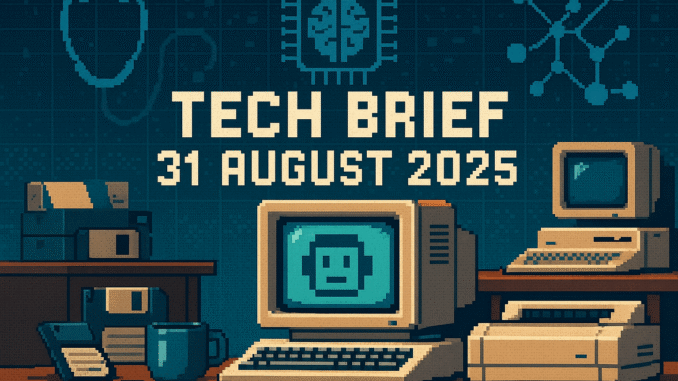
Tech Brief 31 August 2025 lands with a familiar thud: government tech blunders, AI in the doctor’s office, and the browser battle that refuses to die. If you thought public sector IT disasters peaked with sideways fax machines or floppy disks, today’s stories will give you a strong sense of déjà vu. Missed yesterday’s Tech Brief? Catch up here before diving in.
Government Review Blames “Systemic Failures” for Major Data Breaches
“Systemic failure” is not a new refrain for anyone who has followed Whitehall tech. This time, a review covering eleven high-profile UK government data breaches in 2023 has finally surfaced, after being hidden for two years. The findings are damning. Public sector departments fell into elementary traps: emails sent to the wrong addresses, personal data lurking unredacted within shared spreadsheets.
It reads like a checklist from an old BOFH column, except with much higher real-world stakes. MPs are now demanding answers for breaches that exposed military allies and child abuse survivors, making privacy concerns painfully real for hundreds of British citizens. Archive logs from the 1990s prove government IT mishaps are nothing new, but it is the lack of progress, rather than the technology itself, that stings.
Why does the state always seem a punch card behind?
Doctors Launch AI Stethoscope for Rapid Heart Disease Detection
Can a tool invented before the telegraph function in an AI-driven clinic? Apparently, yes. London doctors just revealed a digital stethoscope that merges 19th-century hardware with software capable of diagnosing major heart conditions in a quarter of a minute.
None of the classic functionality is lost. You still get the thump and click of traditional use, but now, every listen is processed via machine learning models trained on a vast dataset of heart rhythms. What grabs me is the retrofitting ethos: keep the reliable everyday device, just layer in some contextual intelligence. In some ways, it is reminiscent of those “internals swap” upgrades Spectrum enthusiasts used to perform, keeping the form but swapping guts for something cleverer.
If only every legacy system could be updated this elegantly.
Meta’s Celebrity Chatbots Spark Ethics Row Over Digital Consent
Taylor Swift and Scarlett Johansson chatbots, built and shipped without any green light, have left Meta answering difficult questions about digital identity and consent. This week’s Reuters exposé confirms Meta forged ahead with flirty AI avatars, training personalities on the likeness and habits of stars, no contracts involved.
It is a sharp reminder of the earliest online imposters, but this time the fakery is corporate policy rather than a hobbyist’s 1200-baud prank. Privacy expectations have changed, even if the underlying tech mischief looks familiar. For users, the stakes are higher, as consent grows ever more complex in large language model environments.
If you ever wondered what would happen if SmarterChild landed a record deal, now we know.
EU to Fine Google Over Adtech Practices, Escalating the Long Browser Battle
The European Union will slap Google with a “modest” fine over antitrust violations in its ad business. It is not a whopper, but it adds fuel to a contest with echoes as old as the browser wars of the 1990s. Regulators say Google has given unfair advantage to its own ad stack, squeezing out rivals and limiting choice for millions of users across the continent.
Anyone who remembers wrestling with default browser prompts or watching Microsoft’s icon crawl across an old CRT monitor will recognise the stubborn persistence of these regulatory spats. This skirmish may not shift Google’s balance sheet much, but it stays in the same legal folder as the historic fights between Netscape and Internet Explorer.
A modest fine today; but the battle for digital control is anything but over.
From the Wayback Machine
On This Day: 1997, Princess Diana’s tragic car crash in Paris shifted the world’s focus to vehicle safety and media ethics. Her Mercedes S280 limousine had modern crumple zones, ABS brakes, and airbags; yet that was not enough. Neither Diana nor Dodi Al Fayed wore seat belts, and the car’s previous repair history raised fresh questions. The lasting legacy: stronger rear seatbelt campaigns, new crash test standards, and the rise of electronic safety systems like event data recorders. The accident remains a profound moment in public discussion about privacy, technology, and what safety really means.
What This Means
If Tech Brief 31 August 2025 leaves anything clear, it is that tech’s greatest challenge is not inventing smart systems, but convincing humans to use them wisely. Every story this week, from heart monitors to government IT, circles around the same question: will we learn before history repeats itself?
Keep tinkering, keep questioning, and do not trust the default settings. Someone in the old forums always had a better fix, and you might, too.
Missed yesterday’s Tech Brief? Catch up here

Leave a Reply